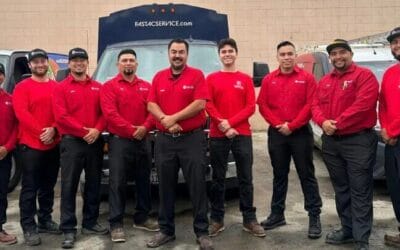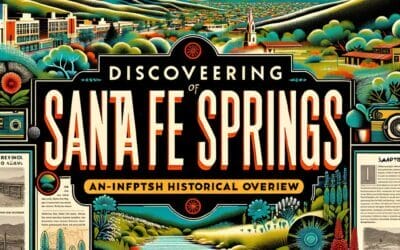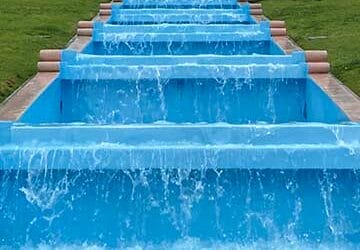Welcome to our enlightening exploration of the rich history of City of Industry, CA. This educational post, packed with expert insights and fascinating facts, is designed to enhance your knowledge about this intriguing area. Whether you’re a history enthusiast or a curious traveler, considering relocating or just learning about different places, this post will surely deliver valuable information. Immerse yourself and discover the captivating past of City of Industry, understand its growth and its impact on California’s development. It’s amazing how much understanding a city’s history can deepen your appreciation for it. So, dive in and enjoy this enlightening journey through time.
Introduction to the Formation of City of Industry, CA
Steeped in rich history and equipped with a unique culture, the City of Industry, situated in the heart of Southern California, offers a fascinating peek into the industrial evolution of this part of the world. The city’s formation certainly makes for an intriguing tale. According to historical accounts, it was the vision of a single man who sought to create an unusual city with a distinctive identity. Tireless efforts led to its inception in 1957, housing a myriad of businesses within its borders and providing a crucial impetus to the economy.
Formation and Early Days
The mastermind behind this unique municipal entity was James Stafford. Under his guidance and vision, Stafford Ranch, a mere sketch in the Los Angeles County’s rural outskirts, transformed into a nerve center of industrial activity. Industry, as it is fondly regarded, has since become a quintessential part of Southern California’s industrial scene. Interesting to note that:
- It spans a whopping 12 square miles.
- Only 200 people reside, while the daytime population swells to more than 80,000.
- It’s home to 3,000 businesses that together generate over $31 billion yearly.
| Year | Significant Event |
|---|---|
| 1957 | City’s incorporation |
| 1971 | Establishment of industrial park |
| 1980 | Commencement of railway service |
This table offers a sneak peek into the important milestones of the City of Industry’s development journey. The topics we discussed are but the tip of the iceberg, and as we delve deeper, we will uncover more about the city’s enriching saga of progress and prosperity.
Understanding the Economic Growth of the City through Years
Tracing the Economic Growth Pattern
The economic landscape of the City of Industry has undergone a profound transformation over the decades. Birthed as a small farming community in the late 18th century, the city has metamorphosed into a powerhouse of industrial and commercial activities. To understand this growth, we delve into significant eras that shaped its economy.
- 18th-19th Century: The city was an agrarian economy, primarily growing citrus fruits and walnuts.
- Early 20th Century: Saw the rise of manufacturing industries, including lumber and textiles.
- Mid-Late 20th Century: Neutral tax laws and zoning ordinances encouraged the growth of light manufacturing and logistics businesses.
- 21st Century: The city is humming with diverse industries from technology, logistics, auto dealing to fashion, and more.
Present-day Economic Landscape
Fast-forward to the present, the City of Industry stands astoundingly diverse, rich and bustling. The city now attracts businesses of all sizes, thanks to its favorable business policies and tax climate. It’s home to around 3,000 businesses, providing employment opportunities to more than 67,000 people. The range of businesses is broad and varied.
| Sector | Companies |
|---|---|
| Technology | Prologis, Newegg |
| Logistics | UPS, FedEx |
| Auto Dealing | Puente Hills Auto Mall |
| Fashion | Hot Topic, Forever 21 |
These businesses, among others, have bolstered the local economy, providing a solid foundation for future growth and prosperity. Despite the diversity, each company contributes to powering the city’s economy, making it a major player on the map of California. The City of Industry indeed lives up to its name, reflecting an impressive saga of economic transformation over the years.
Infusion of Culture and Diversity in City of Industry, CA
The City of Industry, or simply referred to as Industry, nestles in the San Gabriel Valley, CA. Wholly incorporated on June 18, 1957, it gloriously stands as a testament to the industrial boom of the 19th and 20th centuries. Yet, to merely label Industry as a city of warehouses and factories would be an immense disservice to its richly diverse history threaded with cultural infusions from epidemic waves of immigration. Anyone who takes a closer look will find a veritable melting pot of cultures and ideas that have shaped the city into a vibrant and unique place that it is today.
Firstly, the cultural diversity of the city can’t be mentioned without a nod towards its native Tongva inhabitants and the Spanish missionaries. Establishment of the San Gabriel Mission by Junípero Serra in 1771 marked a turning point as it led to the agricultural development of the region. Subsequently, the Mexican and Asian immigrants significantly influenced the socio-economic growth of the region, adding layers of rich cultural heritage.
| Timeline | Major Events |
| Native Era | Settlement of Tongva Peoples |
| 1771 | Establishment of San Gabriel Mission |
| Mid 1800s – Late 1900s | Wave of Mexican and Asian immigration |
The city has always recognized and celebrated its multicultural roots. Several cultural festivals, ranging from the Mexican Cinco De Mayo to the Chinese Lunar New Year, are held all around the city annually. These festivals serve not only as a source of fun and excitement, but also as a platform for diverse cultures to express themselves and for others to learn about them. From the delectable cuisine to the various artefacts and traditional clothing, every aspect of these festivals reflects the city’s cultural wealth and diversity.
- Mexican Influence: Mexican-inspired architecture, art, food, and music permeate the city’s landscape.
- Asian Influence: Large Asian supermarkets, restaurants, and annual cultural festivals reflect the significant Asian population’s influence.
Indeed, the City of Industry is more than an industrial hub; it is a historical tapestry woven with colourful threads of varied cultures. The city invites everyone to delve deeper into its rich history and soak in its vibrant cultural panorama. Understanding this multicultural identity, one gets an appreciation for the rich cultural tapestry that has shaped this city and continues to do so.
Significant Landmarks and Their Historical Importance
Taking a stroll through the City of Industry, California, one can’t help but be in awe of the significant landmarks embedded in this community. This city showcases landmark sites that have shaped both local and national history. One such place is the Workman and Temple Family Homestead Museum. This historic home dating back to 1841, is an encapsulation of the changes in this area from a Mexican rancho to an American ranch. The museum hosts a range of artifacts that provide a glimpse into the lives of the Workman-Temple family and their influence on the development of Southern California.
The City of Industry also boasts the La Puente Valley Historical Society, which is devoted to preserving the rich history of the area. This society exhibits a range of resources including photographs, newspapers, and documents, all painting a colorful tapestry of the city’s past. Another gem is the Hsi Lai Temple, one of the largest Buddhist temples in the Western Hemisphere. Erected in 1988, it serves as both a spiritual and cultural center, demonstrating the city’s commitment to cultural diversity and religious freedom.
Landmark Sites:
- Workman and Temple Family Homestead Museum
- La Puente Valley Historical Society
- Hsi Lai Temple
A Brief Overview of Significant Landmarks:
| Landmark | Year Founded | Significance |
|---|---|---|
| Workman and Temple Family Homestead Museum | 1841 | Depicts lives of influential Workman-Temple family |
| La Puente Valley Historical Society | N/A | Preserves rich history of the area |
| Hsi Lai Temple | 1988 | One of the largest Buddhist temples in Western Hemisphere |

Authentic Cuisine and Gastronomy of the City’s Rich History
The city of Industry, CA , has a unique and intriguing culinary history, deeply embedded in its rich past. Trades from the origins of the city, such as agriculture, industry, and commerce, have heavily influenced its gastronomy. The city’s food scene, with its traditional roots, offers a tasty journey through time, telling stories of the city’s past.
Local dishes demonstrate a unique blending of cultures, with signature dishes that add a delightful flavor to the city’s history. Notable dishes include the chorizo and egg breakfast burrito, a local favorite with Mexican origins, and the walnut shrimp, a Chinese invention that has found a home in the heart of the city’s many Asian-American communities.
Dining establishments have also played a significant role in the city’s rich history. Many of these have been in operation for decades, serving as landmarks and part of the town’s identity. Two of the most popular places include the In-N-Out Burger, a fast-food chain that has called City of Industry home since 1948, and the yet older Fraternal Order of Eagles Aerie #2810, a bar and grill in operation since the ‘30s.
| Restaurant | Established |
|---|---|
| In-N-Out Burger | 1948 |
| Fraternal Order of Eagles Aerie #2810 | 1930s |
In conclusion, City of Industry’s culinary heritage provides a gratifying trip for the taste buds and a cultural exploration of its rich history. Sampling the local cuisine gives one a plateful of the city’s history and a taste of its multicultural influence.
Exploring the Hidden Historical Gems of City of Industry, CA
The City of Industry, a predominantly industrial suburb of Los Angeles, holds more historical treasures than you might imagine. Essentially the city’s core, The Workman and Temple Family Homestead Museum is a revelation for any history buff. The museum grounds are home to a rich tapestry of time periods with the Workman House representing mid-19th-century life, the La Casa Nueva featuring Spanish Colonial Revival architecture of the 1920s, and the El Campo Santo, one of the oldest private cemeteries in California. From artifacts that point to its Native American origins to relics from Spanish missionary times, the museum presents a vast array of historical nuggets.
A hidden surprise in the midst of the city’s commercial environment is The Vineland Drive-In Theater. Built in 1955, it serves as one of the few remaining drive-in theaters in California, offering a classic, cinematic experience that transports you back in time. The City of Industry is not just about factories and organizations. It also boasts The Pacific Railroad Museum which displays a collection of historic railroad equipment and memorabilia, capturing the essence of the industry that heavily contributed to the development of the region.
| Historical Place | Era | Unique Feature |
|---|---|---|
| Workman and Temple Family Homestead Museum | Mid 19th century to Early 20th century | Variety of architectural styles |
| Vineland Drive-In Theater | 1955 | One of the few remaining Drive-in theaters in California |
| The Pacific Railroad Museum | Mid 19th century onwards | Exhibits of unique railroad equipment and memorabilia |
An exploration of the City of Industry takes you on a historical journey that’s as diverse as it is fascinating. Delve into these hidden gems and uncover a side of the city that brilliantly juxtaposes the hustle and bustle of its industrial side with pockets of historical significance, allowing its residents and visitors to truly appreciate its humble origins.
How to Fully Experience the History of City of Industry, CA
Embrace the Industrial Past
The City of Industry’s rich past is deeply embedded in its industrial history, dating back to the late 1950s. The city began its life as an industrial suburb, created to foster rapid economic growth and support the booming manufacturing sector. Today, it’s a testament to this golden age, best explored through its surviving structures and spaces. An essential visit is the Workman and Temple Family Homestead Museum. This historic site spans the early development of California from its days as part of Mexico to its induction into the US. Within its almost 50 acres, you’ll find rich collections of period artifacts, vintage cars, and extensive records that foster an appreciation of the region’s past.
Appreciate Local Art and Multicultural Heritage
For those with a passion for the visual, the City of Industry offers more than just pure history. It’s also an enclave of creativity and diverse culture. A top spot is the Vincent Price Art Museum based in East Los Angeles College, known for its Latin American art. Plus, the city also celebrates its multicultural heritage through various festivals and events throughout the year. Spectrum of cultural traditions breathe life into the city from vibrant Asian Lunar New Year festivities, widely celebrated Cinco de Mayo events, to the traditional Christmas tree lighting ceremony. Experiencing these is like stepping into different pages of the city’s historical and cultural diary.
| Must-Experience Sites | Tips |
| Workman and Temple Family Homestead Museum | Plan your visit on a day when Historical Tours are available. |
| Vincent Price Art Museum | The museum is free to attend, but donations are appreciated. |
| City of Industry Festivals | Check the city’s events calendar in advance to plan your attendance. |
Future Outlook
In conclusion, the rustic allure of City of Industry, California lies not only in its industrious spirit and economic contributions but also in its extensive and intriguing history. It’s a city that holds a unique position in the tapestry of American history. As we delve deeper into its past, we only gain a more profound appreciation and understanding of its cultural importance and the forces that have sculpted it. A silhouetted past filled with booming ranches, iconic filmography locations and a hardworking, resilient spirit steeped in a rich western heritage. This wealth of knowledge adds a new dimension to its urban identity, revealing the City of Industry as a place that’s played an essential role in shaping the socio-economic fabric of California, a journey whose nuances echo in its present glory. For residents, visitors and history enthusiasts alike, this exploration offers a fascinating, enlightening and enriching experience providing a clearer perspective of the past that propels City of Industry toward its future.



